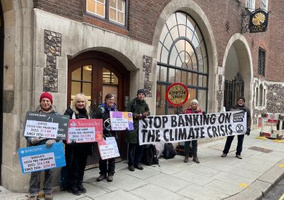ActionAid UK has decided to close most of its accounts with HSBC after investigating the bank’s environmental impact.
Yesterday, the international development charity published a report which claims that HSBC’s financing of fossil fuels and industrial agriculture between 2021 and 2023 was linked to an estimated £128bn in climate-related damage.
The charity said the findings “expose a stark disconnect between HSBC’s alleged green promises and its actions”, and that “while the bank talks sustainability, its investments are fuelling environmental destruction and social harm”.
In light of the findings and HSBC’s recently announced delay to its net-zero target, ActionAid UK will move the majority of its accounts away from the bank after “years of raising the alarm over its climate and human-rights record”.
The charity would not reveal to Civil Society how much money it will move from HSBC, but confirmed that it would transfer its bank accounts and cash deposits to Lloyds Bank.
Hannah Bond, co-chief executive at ActionAid UK, said: “HSBC’s financing of environmentally destructive industries has been well-documented, but this report reveals how deep the harm runs.
“From Bangladesh to Brazil to Tanzania, billions are still flowing from city boardrooms into industries driving the climate crisis, with huge impacts on human rights.
“And it’s the communities we work with, especially women and girls, who are left to carry the burden.
“HSBC’s investments show it is choosing profit over people and planet. Moving our money is not just symbolic; it’s a vital first step in challenging destructive financial systems and standing firmly by our values.”
Report findings
According to ActionAid UK’s report, between 2021 and 2023, HSBC provided £153bn in financial flows to the fossil fuel and industrial agriculture sectors.
This includes £142bn in loans and underwriting and £11bn in investments in bonds and shares.
“As a result of these financial flows, HSBC has generated 357 million tons of carbon dioxide equivalent,” the report reads.
“This includes 323 million tons as a result of loans and underwriting and 34 million tons from investments.
“The societal costs of these emissions are calculated at £128bn in climate damages, equivalent to three times HSBC’s accumulated net profit in this period.”
The report says HSBC’s financial flows to companies that operate in the global south are causing or contributing to human rights and environmental harm, including land grabbing, deforestation, displacement of communities and gender-based violence.
“Even in cases where HSBC is not financing harmful extractive projects directly, HSBC continues to finance companies engaged in harmful extractive activities through corporate financing, thereby indirectly financing their projects and allowing these industries to continue.”
Net-zero target pushed back by 20 years
Earlier this year, HSBC revealed that it had pushed back plans to achieve net zero in its own operations and supply chain by 20 years, extending this target to 2050.
ActionAid UK wrote in its report that this delay “shows a deep discord between the need to address the climate crisis with urgency, and the real consequences for communities bearing its effects on a daily basis”.
The report adds that the bank’s policies on fossil fuels, industrial agriculture and human rights “are insufficient in addressing the climate crisis and the direct impacts of these sectors”.
It reads: “HSBC’s policies don’t effectively address the extent of its financial flows to the two sectors with the largest contribution to the climate crisis.
“HSBC’s policies also lack the level of safeguarding mechanisms necessary to prevent harming of local communities and provide adequate reporting and response to harm.”
Civil Society has contacted HSBC for comment.
Related articles












